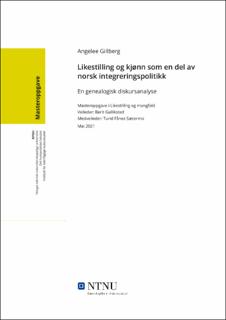| dc.contributor.advisor | Gullikstad, Berit. | |
| dc.contributor.advisor | Sætermo Fånæs, Turid. | |
| dc.contributor.author | Gillberg, Angelee. | |
| dc.date.accessioned | 2021-09-24T18:31:18Z | |
| dc.date.available | 2021-09-24T18:31:18Z | |
| dc.date.issued | 2021 | |
| dc.identifier | no.ntnu:inspera:78640433:13304850 | |
| dc.identifier.uri | https://hdl.handle.net/11250/2781836 | |
| dc.description.abstract | Denne masteroppgaven undersøker hvordan forståelsen av likestilling og kjønn har endret seg over tid i norsk integreringspolitikk. Synliggjøringen av pluralistiske forståelser gjennom ulike perioder, har som mål å vise til at makt konstruerer sannhet, i tråd med Foucaults genealogiske diskursanalyse. Materialet for analysen er tre stortingsmeldinger som omhandler integrering, i perioden 1997-2016. Med utgangspunkt i postkolonial teori, interseksjonalitet og Bacchis analysemodell for politikk, analyserer jeg hvordan ’likestilling’ og ’innvandrerkvinnen’ blir forstått i integreringspolitikken, samt hvilke effekter som kommer av disse fremstillingene. Forståelser av innvandrere som fremkommer i politikken blir også diskutert.
Likestilling har gått fra å være forstått som en samfunnspraksis for rettferdighet og en essensiell del av integreringspolitikken, til å bli nesten helt borte. Disse endringene kobler jeg sammen med at ansvaret i stor grad har blitt forflyttet fra staten til individet. ’Innvandrerkvinnen’ er et tema gjennom alle tidsperioder og blir forstått som et offer med manglende innflytelse over eget liv, som noen med manglende motivasjon for arbeid og som en snylter. Til tross for at egenskapene som tilskrives ’innvandrerkvinnen’ transformeres, viser analysen at kategorien representerer en konstant marginalisert posisjon. Forståelsen av innvandrere har gått fra å være sett på som en ressurs for samfunnet, til å bli sett på som en potensiell byrde, parallelt med at en økonomisk rasjonalisert tankegang har fått feste i integreringspolitikken. De forskjellige forståelsene av likestilling og ’innvandrerkvinnen’ tar utgangspunkt i ’det norske’ som et universelt utgangspunkt. Rasialiserende forståelser ligger til grunn for samtlige fremstillinger i integreringspolitikken, om enn gjennom forskjellige uttrykk. Dette gjør at innvandrere aldri blir forstått som likeverdige, og integrering vil kunne forstås som integrering til et underordnet medborgerskap. | |
| dc.description.abstract | This master’s thesis examines how the understanding of equality and gender has changed over time in Norwegian immigration policy. The visibility of pluralistic understandings through different periods aims to show that power constructs truth, in line with Foucault’s genealogical discourse analysis. The material for the analysis is three government white papers on immigration, in the period 1997-2016. Based on postcolonial theory, intersectionality and Bacchi’s analytical model for politics, I analyze how ‘equality’ and ‘immigrant women’ are understood in immigrations policy, as well as the effect that come from these representations. Understandings of immigrants that emerge in politics are also discussed.
Equality has gone from being understood as a societal practice of justice and an essential part of immigration policy, to disappearing almost completely. I connect these changes with the fact that responsibility has largely been transferred from the state to the individual. The ‘immigrant woman’ is a topic throughout all time periods and is understood as a victim with a lack of influence over her own life, as someone with a lack of motivation for work and as a scrounger. Despite the fact that the characteristics attributed to the ‘immigrant woman’ are being transformed, the analysis shows that the category represents a constantly marginalized position. The understanding of immigrants has gone from being seen as a resource for society, to being seen as a potential burden, in parallel with an economically rationalized way of thinking becoming entrenched in immigration policy. The different understandings of equality and the ‘immigrant woman’ is based on ‘the Norwegian’ as a universal starting point. Racializing understandings form the basis of all representations in immigration policy, albeit through different expressions. This means that immigrants are never understood as equal, and integration can be understood as integration into a subordinate citizenship. | |
| dc.language | nob | |
| dc.publisher | NTNU | |
| dc.title | Likestilling og kjønn som en del av norsk integreringspolitikk. En genealogisk diskursanalyse. | |
| dc.type | Master thesis | |
